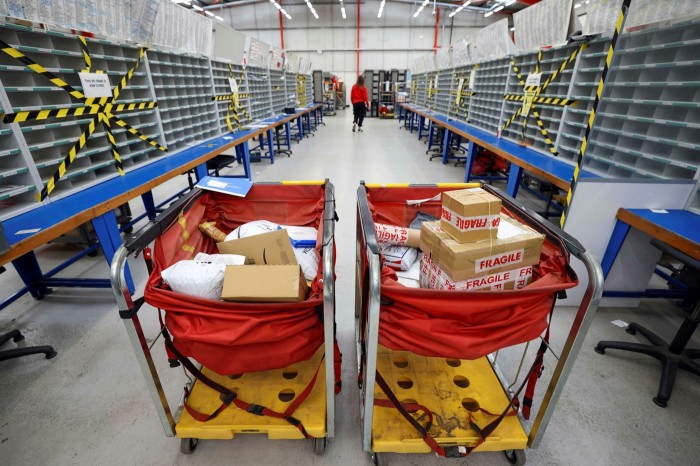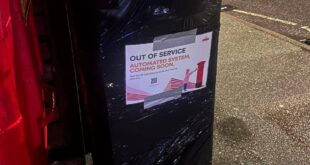Just a day before Royal Mail revealed plans last month to drop its iconic group brand and potentially split the business, postal workers voted to go on strike.
Staff wanted industrial action over pay, as inflation rocketed to its highest level in four decades. Royal Mail said the following day that it was planning to rename the group International Distributions Services and possibly break up the company.
At the heart of the issue is the UK’s lossmaking postal business, which will continue to be named Royal Mail. The group admitted that it had become increasingly reliant on its profitable overseas operations, called GLS. Such is the divide in fortunes, the group is now considering hiving off the different businesses.
But the plans have rattled the Communication Workers Union, which represents postal staff. The mounting tension underscores the battle the company faces between striving for efficiencies to rejuvenate Royal Mail and keeping workers on side.
“It is pathetic that Royal Mail, a company which announced [annual] profits of £758mn mere weeks ago, is now pleading poverty and threatening fragmentation unless they get their way,” the CWU said.
“Our members are committed to growing Royal Mail as a high quality public service — they deserve a decent pay rise,” they added.
The rebrand is the second attempt by the group in two decades to ditch the iconic moniker for the longstanding service, which was founded by King Henry VIII in the 1500s. The Royal Mail name was briefly abandoned in 2001 in favour of Consignia, which was swiftly ditched 16 months later.
Although the UK postal service fared well during the coronavirus pandemic as people relied on deliveries at home, the group’s recent quarterly results paint a different picture.
Profit in the three months to the end of June was driven by GLS, the Amsterdam-based parcel sorting subsidiary, as the UK postal service reported an operating loss of £92mn.
“Financially it’s a tale of two halves in our two businesses Royal Mail and GLS,” said the group’s chief financial officer Mick Jeavons. “It illustrates that we are increasingly becoming financially reliant on GLS.
“Parcel volumes have now declined from the peaks we saw during Covid,” he said, adding that Royal Mail made a million pounds a day of losses in the quarter. The overall group has lost almost half its value this year.
Still, Jeavons insisted that the company does not necessarily have plans to sell. “We’re just emphasising . . . that if we can’t deliver progress and change in Royal Mail in the UK . . . these businesses probably are better not together,” he explained.
Robin Byde, analyst at Zeus Capital, said splitting up the businesses had been discussed “pretty much since IPO”.
Byde said there is some “strategic logic to carving out GLS and realising additional value for shareholders and stakeholders”.
“You can make a case that the synergies between those two businesses are not that great. They have different focuses, the international business is obviously growing very strongly and the domestic business is more about managed decline,” he added.
The CWU has taken a different stance. The union has cited the profit in the last fiscal year and the return of £400mn to shareholders when arguing for a pay increase.
Despite the union’s criticism, Royal Mail described its performance in the UK during the pandemic as a “lifeline”. It reported £8.6bn in revenues in the year to the end of March, up 12 per cent on the previous year.
The company stands by its decision in November to return £400mn to shareholders “not least because employees represent our fifth largest shareholder group so they have also received these payments”.
“Two-thirds of the dividends which have been paid to shareholders over recent years have been funded from the reported profits of the international business, GLS,” the company said. “Royal Mail has only contributed a third of the dividend return to shareholders and its contribution will be even less this year, if indeed there is anything at all.”

Royal Mail chief executive Simon Thompson has insisted on discussing pay and conditions simultaneously — an echo of the stalemate between Network Rail and transport unions.
“What we’ve said to the CWU is that we are happy . . . to meet with them any time they wish to discuss pay and change, but we’ve got to discuss pay and change at the same time,” he said.
The CWU is conducting a separate balloting of its members for industrial action on terms and conditions.
Thompson is adamant that change is needed in the UK business and believes it can turn a corner.
“[The] surge in parcels and test kits have shown that we can be profitable,” he said. “But we are in a situation now where we need to change our ways of working so we can really get the benefit of the £900mn worth of investment we’ve made, so we can win and compete in the parcels market.”
Jeavons said the company has been unable to adjust its cost base fast enough in response to volume declines, because of the focus on discussions with trade unions. “We now need to get on with the change,” he added.
Royal Mail expects to break even in the UK this year, so long as it can make progress on stripping out costs.
One area ripe for overhaul is Sunday deliveries, said Thompson. “Around about half of our Sunday deliveries are done through temporary workers and we’re certainly grateful for their help, but in terms of quality and productivity it’s not as good as what we would get from the core team.”
Source link



